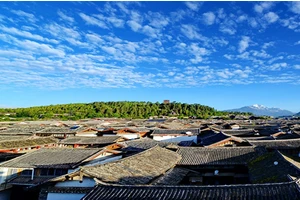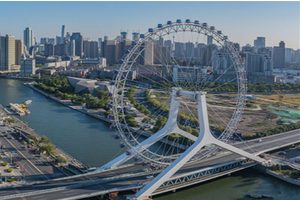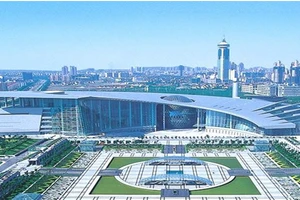Tourism land evaluation
The procedures for applying for tourism land are divided into the following steps: 1. Applicants need to apply for the “Pre-examination Form” from the local village or town civil affairs office and fill in the basic information of tourism development projects. 2. Submit the Pre-examination Form and related materials, such as land certificate, planning certificate and environmental assessment documents. 3 in the village, town government or county tourism department for preliminary examination, preliminary evaluation of the project and put forward amendments. 4. Improve the project documents, and apply for approval from relevant departments such as land, planning, environmental protection and construction. 5. After the examination and approval of each department, it is necessary to apply for the examination and approval of the local tourism bureau and obtain the approval letter and land use certificate for tourism land. 6. After obtaining the approval letter and land use certificate for tourism land, you can go through the registration, land allocation and land transfer procedures at the local land bureau. Matters needing attention: 1. Applicants need to be fully prepared to ensure that the project is legal, reasonable and feasible. 2. The application process needs to involve multiple departments, and it is necessary to coordinate the relationship between all parties to ensure the smooth approval of each department. 3. In the application process, we need to pay attention to the provisions of laws and regulations to ensure that the project is legal and compliant.
The state has the following preferential policies for tourist land:
First, actively protect the supply of land for tourism development.
1. Effectively implement new construction land for key tourism projects.
In accordance with the principles of resource and ecological protection, cultural relics safety, and economical and intensive land use, on the basis of linking with the overall land use planning, urban and rural planning, scenic area planning, environmental protection planning and other related planning, accelerate the preparation of tourism development planning. To meet the relevant planning of tourism projects, all localities should, in accordance with the project construction sequence, timely arrange new construction land planning indicators, handle land conversion, expropriation or recovery procedures according to law, and actively organize the implementation of land supply. Increase the protection of land for poverty alleviation through tourism.
2, support the use of unused land, wasteland, remote islands and other land to build tourism projects.
Under the premise of meeting the requirements of ecological environment protection and related planning, priority should be given to the new construction land planning indicators for tourism projects that use barren hills, wasteland, barren beaches and rocky desertification and remote islands, and the reserve price can be determined according to the principle of not less than the sum of land acquisition cost, land pre-development cost and relevant fees charged according to regulations. For tourism projects that reclaim and utilize the damaged land left over from history, such as garbage dumps and abandoned mines, all localities can formulate support policies in accordance with the principle of “whoever invests will benefit” to attract social investment and encourage land owners to reclaim themselves.
3, according to the implementation of land classification management system.
Tourism projects, which belong to permanent facilities construction land, shall be managed according to the law; Belonging to natural landscape land and land for farming, animal husbandry and fishery planting and breeding, it will not be collected (recovered) or used for other purposes, and will be managed according to the current use. The scenic spot management institutions and business entities and land owners will coordinate the relationship between planting, breeding, management and protection and tourism management according to law.
4, multi-way supply of construction land
In the land for tourism-related construction projects, if the use is single and meets the statutory allocation scope, it can be supplied by allocation; If the use is mixed and includes business use, it shall be supplied by bidding, auction and listing. Among them, the artificial landscape land such as film and television city and antique city shall go through the planning procedures according to the “recreational and recreational land” in the Standard for Urban Land Classification and Planning and Construction Land, and the land supply mode, price and service life shall be determined according to the law according to the tourist land.
For the construction of pavilions, platforms, plank roads, toilets, trails, ropeways and cable cars in scenic spots, the planning procedures can be handled according to the Urban Land Classification and Planning Construction Land Standards and other construction land, and the land supply procedures can be handled with reference to the park use. The planning, construction and management of scenic spots shall abide by the relevant laws, administrative regulations and the provisions of the State Council. Encourage the supply of land for construction of tourism projects by means of long-term lease, first lease and then lease, and combination of lease and lease.
5, increase the security of tourist toilet land.
We should attach great importance to the civilized window position and basic public service role of tourist toilets in the development of tourism. If new construction land is needed for the construction and renovation of tourist toilets and related facilities for the harmless treatment of excrement, the construction unit of tourist toilets can apply for it in a centralized way before 2018, and go through the land use procedures in a centralized and unified way in accordance with the statutory approval procedures, and all localities will make special arrangements for new construction land planning indicators.
In accordance with the “Catalogue of Allocated Land”, the fecal treatment facilities can be supplied by allocation. Supporting the construction of tourist toilets in other projects, the construction requirements can be included in the land use conditions when supplying land for other projects. After the land is supplied, the relevant right holders will clarify the property rights relationship of tourist toilets according to law.
Second, clarify the land use policy for new tourism formats
1. Guide the standardized development of rural tourism.
Under the premise of conforming to the overall land use planning, county rural construction planning, township and village planning, scenic spot planning and other related plans, rural collective economic organizations can use construction land to run their own businesses or jointly organize tourism reception service enterprises such as accommodation, catering, parking lots with other units and individuals by means of land use rights, joint ventures, etc. According to the management measures formulated by provinces, autonomous regions and municipalities directly under the central government, urban and rural residents can use their own houses or other conditions to engage in tourism business according to law.
Units and individuals other than rural collective economic organizations may, in accordance with the law, use agricultural land and unused land collectively owned by farmers to engage in tourism-related planting, forestry, animal husbandry and fishery production through contracted management circulation. Support to optimize the layout of rural construction land and build tourism facilities by carrying out pilot projects linking the increase and decrease of urban and rural construction land.
2. Promote the orderly development of self-driving and RV camp tourism.
In accordance with the principles of “market orientation, scientific layout, rational development and green operation”, we will speed up the formulation of construction planning and construction standards for self-driving RV camps. The land for the new self-driving RV camp project shall meet the requirements of relevant planning, complete garbage and sewage treatment facilities, environmental protection of building materials, harmony between architectural style and color and local natural and cultural environment. The land use of the self-driving RV camp project is managed according to the hotel land, and the supply reserve price, supply mode and service life are determined according to the tourist land.
3. Support the optimized development of cruise and yacht tourism.
The land for newly-built cruise ships and yacht docks shall be used for compensation. The land for paid use of cruise ships and yacht docks can be supplied by agreement. If cruise ships and yachts are added to the existing docks, the existing types of land rights can be kept unchanged; If commercial service facilities such as accommodation, catering and entertainment are added by using the existing dock facilities and real estate, the land use formalities can be handled by agreement upon approval.
4. Promote the development of cultural and research tourism.
Using the existing cultural heritage, large-scale public facilities, well-known universities, scientific research institutions, industrial and mining enterprises and large farms to carry out cultural and research tourism activities, on the premise of conforming to the plan and not changing the land use, if the land owners of the above institutions use the existing real estate to set up accommodation, catering and other tourism reception facilities, the original land use and right type can be maintained unchanged; If the land owner applies for land use procedures, it can be handled by agreement upon approval. New buildings and structures in the construction control zone of historical and cultural blocks shall meet the construction control requirements determined by the protection plan.
Extended data
Policies to strengthen the supervision of tourism land service;
1. Do a good job in the registration of ownership.
All localities should, in accordance with the Provisional Regulations on the Registration of Real Estate and other laws and regulations, and in accordance with the requirements of the unified real estate registration system, constantly enhance their service awareness, persist in facilitating enterprises and the masses, reduce the number of procedures for obtaining permits, improve work efficiency, improve service quality, actively do a good job in the registration and certification of real estate such as land for tourism development, clarify property rights and protect rights and interests according to law, and provide necessary property rights protection and financing conditions for tourism development.
2. Establish a joint supervision mechanism among departments.
The development of tourism resources such as scenic spots, nature reserves and national parks, and the management of land supply and use for construction projects should be in line with the overall land use planning, urban and rural planning, scenic spot planning and other relevant regional protection, development and construction planning. If it does not meet the requirements, land use and land supply shall not be approved.
New land for tourism projects, environmental protection facilities construction, the use of building materials, architectural style coordination and other requirements into the pre-conditions of land supply, the government departments that put forward the conditions should sign relevant construction activity agreements with the land use right holders, and perform their supervisory duties according to law. It is necessary to sum up the practice of land use in tourism industry in time and actively carry out research and exploration and innovation on major issues of land use in tourism industry.
3. Strictly supervise the supply and utilization of tourism land.
Strictly control the use of tourism-related agricultural land and unused land, and change it to construction land without approval according to law, and be investigated for responsibility according to law. It is strictly prohibited to transfer or disguise the resources of scenic spots and their land in any name and manner. If the land supply behavior is regulated and the land is supplied by agreement, the transfer fee shall not be lower than the lowest price determined according to state regulations.
Strict residential management of tourism projects in complementary goods, where the overall land use planning and urban and rural planning are required to be revised due to the supporting arrangement of commercial housing for tourism projects, shall not be approved. Strictly manage the change of use of land for related tourist facilities, and it should be clearly stipulated in the land supply contract that the whole or part of the change of use for commercial housing and other business projects should be recovered by the government and re-supplied according to law.
Reference: Ministry of Natural Resources of People’s Republic of China (PRC)-Opinions on supporting land use policy for tourism development






